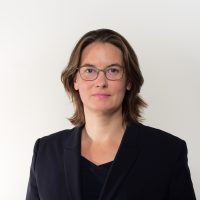AGI News
Anna Körs, DAAD/AGI Research Fellow

Anna Körs
University of Hamburg
Dr. Anna Körs is a DAAD/AICGS Research Fellow in October and November 2022.
She is scientific manager and vice director at the Academy of World Religions (AWR) at the University of Hamburg. She holds a Ph.D. in sociology and was Interim Professor for the sociology of religion at the Institute of Sociology at the University of Münster in 2018 and deputy head of the research project ‘Religion and Dialogue in Modern Societies,’ funded by the German Ministry for Education and Research, 2013-2018, at the University of Hamburg.
In her current research she focuses on the governance of religious diversity at the meso-level of organizations and institutions and investigates the processes of transformation in contemporary societies, focusing on religion, politics, and education, both qualitatively and quantitatively, and from a comparative perspective. She has published widely on the topic of governance and religion in several international journals including “Contract governance of religious diversity in a German city-state and its ambivalences” (Religion, State and Society, 2019), “Local ‘formulas of peace’: Religious diversity and state-interfaith governance in Germany” (Social Compass, 2018), “Interreligious Dialogue Activities in East Germany: Low levels of Activities within Official Organizational Structures” (Interdisciplinary Journal for Religion and Transformation in Contemporary Society, 2020), “The Plurality of Peter Berger’s ‘Two Pluralisms’ in Germany” (Society, 2017). She has also served as co-editor of the books Religious Diversity and Interreligious Dialogue (Cham: Springer 2020) and Religion and Dialogue in the City: Case Studies on Interreligious Encounter in Urban Community and Education (Waxmann, 2018).
During her time at AICGS, she will be expanding her previous research on German cities to the U.S. context and specifically conduct a comparative study of Hamburg and Washington, DC, by doing fieldwork and interviews. Based on theoretical considerations of urban sociology, religious studies, political science, and governance research on the relationship between cities and religions and assuming their recursive relationship the leading questions are: (1) Which forms of local governance have developed in the course of religious pluralization and secularization regarding the religious communities, the governmental level, and cooperative forms (in particular “state-interfaith governance”)? (2) What are the effects of the local governance of religious diversity, and does it help to accommodate religious diversity or foster mechanisms of exclusion? (3) How are the processes of local governance linked to the national level of religious diversity governance and influenced by the different models of church-state relations in Germany and the United States?
AGI is pleased to welcome Dr. Anna Körs as a DAAD/AGI Research Fellow in October and November 2022.
She is scientific manager and vice director at the Academy of World Religions (AWR) at the University of Hamburg. She holds a Ph.D. in sociology and was Interim Professor for the sociology of religion at the Institute of Sociology at the University of Münster in 2018 and deputy head of the research project ‘Religion and Dialogue in Modern Societies,’ funded by the German Ministry for Education and Research, 2013-2018, at the University of Hamburg.
In her current research she focuses on the governance of religious diversity at the meso-level of organizations and institutions and investigates the processes of transformation in contemporary societies, focusing on religion, politics, and education, both qualitatively and quantitatively, and from a comparative perspective. She has published widely on the topic of governance and religion in several international journals including “Contract governance of religious diversity in a German city-state and its ambivalences” (Religion, State and Society, 2019), “Local ‘formulas of peace’: Religious diversity and state-interfaith governance in Germany” (Social Compass, 2018), “Interreligious Dialogue Activities in East Germany: Low levels of Activities within Official Organizational Structures” (Interdisciplinary Journal for Religion and Transformation in Contemporary Society, 2020), “The Plurality of Peter Berger’s ‘Two Pluralisms’ in Germany” (Society, 2017). She has also served as co-editor of the books Religious Diversity and Interreligious Dialogue (Cham: Springer 2020) and Religion and Dialogue in the City: Case Studies on Interreligious Encounter in Urban Community and Education (Waxmann, 2018).
During her time at AGI, she will be expanding her previous research on German cities to the U.S. context and specifically conduct a comparative study of Hamburg and Washington, DC, by doing fieldwork and interviews. Based on theoretical considerations of urban sociology, religious studies, political science, and governance research on the relationship between cities and religions and assuming their recursive relationship the leading questions are: (1) Which forms of local governance have developed in the course of religious pluralization and secularization regarding the religious communities, the governmental level, and cooperative forms (in particular “state-interfaith governance”)? (2) What are the effects of the local governance of religious diversity, and does it help to accommodate religious diversity or foster mechanisms of exclusion? (3) How are the processes of local governance linked to the national level of religious diversity governance and influenced by the different models of church-state relations in Germany and the United States?







